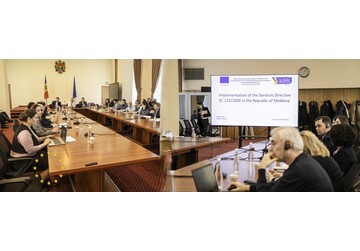
The implementation of the EU Directive on services in the internal market will simplify administrative procedures and remove barriers for service providers – the Ministry of Economic Development and Digitalization
This was mentioned during a seminar organized by the Ministry, which discussed the implementation of the Law on freedom of establishment of service providers and free provision of services, which transposes the Directive 2006/123/EC of the European Parliament and of the Council of 12 December 2006 on services on the internal market, which is an important step in the process of harmonization of the Moldovan legislation with the EU legislation. The event also touched upon the topic of preparation for accession negotiations, and presented the experience of EU countries in elaborating negotiating positions. The event brought together representatives of the Moldovan business environment and public authorities, offering an open dialog platform to analyze the impact of the new regulations, exchange best practices and identify solutions for efficient implementation. The State Secretary of the Ministry of Economic Development and Digitalization, Eugeniu Harabara, said that the implementation of the Directive on services on the internal market will simplify administrative procedures and remove barriers for service providers by creating fair conditions in Moldova, similar to those in the EU countries, and will contribute to the gradual integration into the single European market. EU Legal Advisor Sosanna Lisgara and Project Team Leader Primož Vehar presented EU best practices on effective transposition, highlighting the important role of harmonizing national legislation with EU norms in creating a transparent and non-discriminatory environment in the services sector. The seminar was organized with the support of the “EU-Moldova Association – Support for Structured Policy Dialogue, Coordination of the Implementation of the Association Agreement and Enhancement of the Legal Approximation Process” project. The law on freedom of establishment of service providers and free provision of services will come into force after Moldova's accession to the European Union. Earlier it was reported that this law fully transposes the provisions of the Directive 2006/123/EC of the European Parliament and of the Council of December 12, 2006 on services on the internal market and aims at eliminating the barriers that prevent service providers, especially small and medium-sized enterprises, from benefiting from all the advantages of the EU internal market. Thus, the law will establish a regulatory framework that will be used to re-evaluate the entire system of authorization acts in Moldova. At the same time, the essence of the transfer of the mentioned European directive is to ensure the process of equating the requirements for authorization of services in Moldova with the requirements of the EU states. The authors of the document proposed to create, on the basis of national electronic systems, with the provision of interoperability, a Single Electronic Window, which will become a single point of contact for non-resident service providers. It will be administered by the e-Governance Agency. It is planned that the implementation of this law in practice will have a significant impact on the private environment. One of the results will be increased access of entrepreneurs to the EU market under the same conditions as for any other entrepreneurs in the EU area. This will give companies from Moldova access to the EU market, which has about 450 million consumers, without imposing conditions that will entail unavoidable costs. The law on freedom of establishment of service providers and free provision of services will enter into force on the day of entry into force of the Treaty of Accession of Moldova to the European Union. At the same time, by January 1, 2028, Government will approve the regulatory framework necessary to implement the provisions of the legislation, while the competent authorities will analyze the legislation and make the necessary amendments. // 20.03.2025 - InfoMarket







